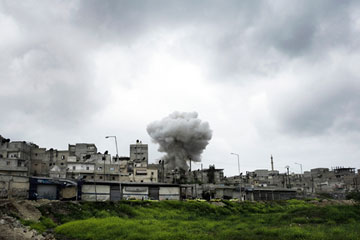
A plume of smoke rises after a rocket fired by a Syrian regime jetfighter impacts in the Sheikh Maqsood neighborhood of Aleppo.
For nearly two years after the Syrian uprising began, in March 2011, Barack Obama managed to keep his distance from an Arab Spring revolution that seemed to promise him only trouble. The White House feared entanglement in another Iraq-style sectarian bloodbath and wasn't sure that whoever might replace Syrian dictator Bashar Assad would be an improvement. Now Syria has become impossible for Obama to ignore. That's partly because of a horrific death toll that has climbed past 70,000. But arguably more significant for the White House is the growing fear that Assad's huge chemical-weapons arsenal poses a threat beyond its borders.
Stopping terrorists from acquiring weapons of mass destruction has been the U.S.'s highest security priority since the attacks of Sept. 11, 2001. President George W. Bush led the U.S. to war against Iraq, he said, to secure Saddam Hussein's supposed arsenal of chemical and biological weapons. Obama opposed that war, but he shares the underlying concern: his 2010 National Security Strategy warned that "there is no greater threat to the American people than weapons of mass destruction."
Syria possesses one of the world's largest chemical arsenals, a stockpile thought to include the nerve agents sarin and VX as well as mustard gas. By some estimates, Assad's regime has over the years brewed up to 1,000 tons of chemical arms. Even as Obama weighs a response to the regime's suspected use of chemical weapons, military and intelligence officials are fixated on the possibility that the dictator's enemies — especially rebel fighters with ties to al-Qaeda — could get their hands on the stuff.
That nearly happened earlier this year when rebel fighters — including some from the Jabhat al-Nusra faction, a group the U.S. State Department says has direct ties to al-Qaeda's leadership in Pakistan — battled close enough to a major chemical stockpile near Aleppo that the regime is believed to have moved its weapons to another location, according to Elizabeth O'Bagy, a Syria analyst at the Institute for the Study of War.
Despite that close shave, a White House official tells TIME, the U.S. believes that Assad still has control of his arsenal. O'Bagy says Syria's chemical facilities are extremely well guarded. But there may be 15 to 20 of those sites, making it difficult for the military to maintain control of them all. And if the Assad regime should begin to crumble, the army could quickly disintegrate, making those sites easy prey. Parachuting in U.S. forces is not an option: the Pentagon says securing the sites could take 75,000 troops on the ground, a scenario no one in Washington can countenance.
With luck, the weapons could be secured by moderate rebels the CIA is training for that task in neighboring Jordan. But they could also be overrun by al-Nusra fighters or others willing to sell their plunder to the highest bidder.
Fortunately, Syria's stockpile was designed for large-scale military action — namely missile and aerial attacks on Israel — and not for the portability and ease of use that would most appeal to terrorists. The sarin-gas weapons are thought to be binary — stored as two separate ingredients that must be combined before lethal use. "You can't just run down the street and throw it into a building," says Jeffrey White, an analyst at the Washington Institute for Near East Policy and a former military-intelligence officer. Without special training and equipment, it would be exceedingly difficult for terrorists to extract the chemicals and transport or deploy them efficiently. Anyone who tried might quickly die.
But some of Assad's weapons are not binary — including mustard gas, which causes severe blistering of the skin and lungs. And weapons meant for missiles or bombers can probably be exploded on the ground in cruder fashion with diminished but still deadly results. Unskilled terrorists can also seek help. "The key would be to get the Syrians trained to use the weapons to defect to Nusra," says Bruce Riedel, a terrorism expert with the Brookings Institution.
Almost as frightening as Islamist rebels' getting their hands on the weapons is the concern that the regime might pass some of them to its allies — like the Lebanese group Hizballah, a client of both Syria and Iran that has long battled Israel and has more sophisticated military capabilities than the Nusra fighters. Israel says this fear is not theoretical and has already conducted air strikes in Syria to destroy conventional weapons it claims were being sent to Hizballah.
But striking chemical sites — which can disperse their contents lethally — is not a practical option for Obama. He is reluctantly considering more aid to friendly rebels who might be trusted to handle chemical arms responsibly. Ten years after the threat of weapons of mass destruction took America to war, however, Obama shows no appetite for letting that happen again.
